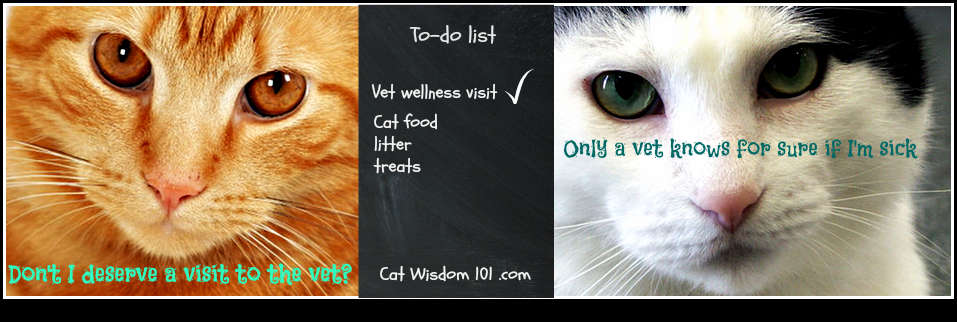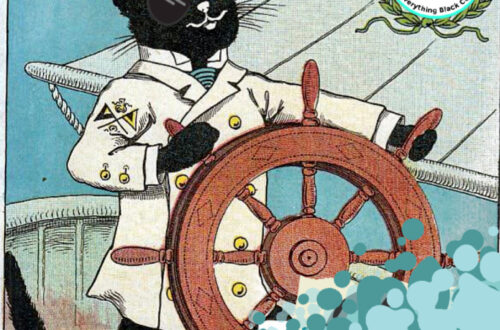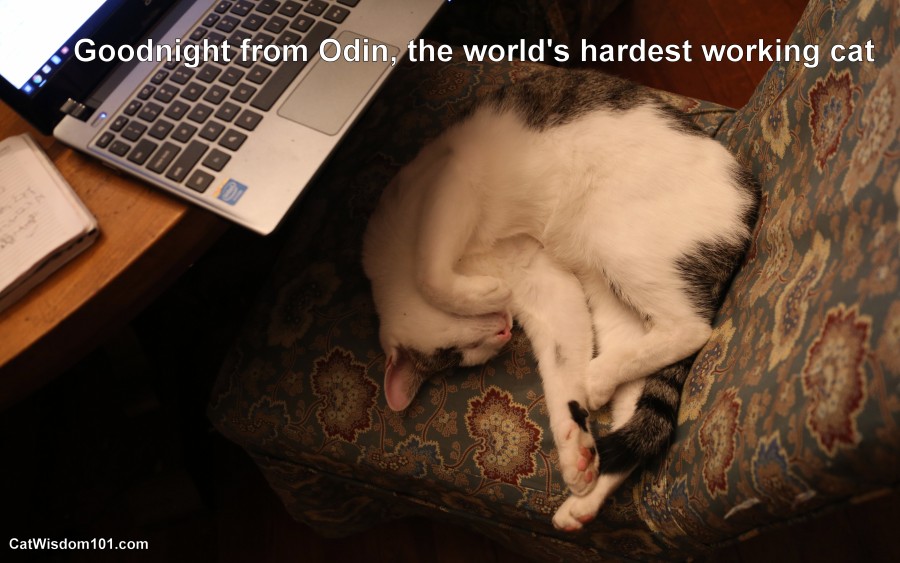Vet 101:Preventive Medicine: Keeping Your Cat Healthy
We’re delighted to share a guest post on an important topic. Veterinarian Lori Huston and I were speaking last week how despite available information, the sad fact is: many myths persist about cats and their need to visit a vet. It’s shocking but true that many pet parents have not brought their cat to vet for years because they don’t seen sick. It’s my hope that veterinary wellness visits will eventually become the norm. Let’s spread the word. Our cats deserve it!

Preventive Medicine: Keeping Your Cat on the Road to Health, guest post by Dr. Lori Huston DVM.
Veterinary care can be expensive. That’s no secret. Most pet owners already know that. It’s probably one of the primary reasons that many cats don’t get the type of preventive health care that they should. To be sure, there are other reasons as well. Sometimes just the act of getting the cat to the veterinarian can be a struggle. It’s often a stressful situation for both cat and owner. In fact, in one survey that explored the frequency of cat veterinary visits and their owners perceptions regarding those visits that explored the frequency of cat veterinary visits and their owners perceptions regarding those visits, 38% of cat owners said they get stressed out just thinking about taking their cat to the veterinarian. That same survey indicated that 58% of cat owners believe their cat hates visiting the veterinarian.
Besides the cost of veterinary care and the stress involved with the visit itself, many cat owners simply don’t realize that their cat needs regular veterinary care. Cat owners tend to perceive their cats as self-sufficient, low-maintenance animals that very rarely need medical attention. And then, only when sick.
- But here’s the thing: Cats are very good at hiding the signs of disease.
- While most cat owners probably believe that they would know if their cat is not feeling well, that’s simply not true in too many situations.
- For instance, many cats develop arthritis as they age. For these cats, the primary sign is often that the cat becomes less active and spends more time sleeping and/or resting, a behavior that is often mistaken as a normal sign of aging rather than a sign of disease.
- Another example is dental disease. As many as 75% of cats over the age of three show signs of dental disease. Dental disease is painful, can affect your cat’s appetite, and can result in the loss of teeth. But dental disease is very difficult for cat owners to diagnose at home, at least not until the cat develops severe complications associated with the disease.
- And here’s another consideration worth pondering: Preventing disease, or catching disease early in its course and instituting appropriate treatment, is most often less expensive than waiting until a disease is advanced before seeking help for your cat. In many cases, it’s much less expensive. Here’s an example. We’re seeing an increase in parasites in our cats, both external parasites such as fleas as well as internal parasites such as intestinal worms. This increase is happening despite the availability of safe and effective preventive medications. These parasites can cause lots of problems for your cat, problems that are expensive to treat, much more expensive than simply preventing the infection to begin with. Heartworms are another, even more serious example. Heartworms are easily preventable and the medication is relatively safe. Heartworm infection, on the other hand, can cause severe respiratory issues and even sudden death. Losing your cat to a preventable disease is, without a doubt, the highest price anyone can pay!
- Regular checkups with your cat’s veterinarian can prolong your cat’s life by spotting disease early, giving you and your veterinarian the chance to begin appropriate treatment and either cure or slow the progress of the disease. In some cases, something as simple as a change in diet can make a difference in your pet’s health and well-being. During these visits, your veterinarian will advise you of any abnormal examination findings and offer suggestions to resolve the issue. However, it’s also a good idea to discuss topics such as diet, dental care and parasite control with your veterinarian.
- Cat owners shouldn’t assume that a cat that lives indoors does not need veterinary care either. Indoor cats are still at risk for diseases such as obesity, diabetes, kidney disease, heart disease, and more. Even parasites can be a threat to indoor cats.
- Today’s veterinary care involves much more than simply administering a few vaccines and sending your cat on his way. In fact, though vaccines remain an important part of your cat’s preventive health care and should not be ignored, we know that cats do not require as many vaccinations as we previously believed. As with all things pertaining to your cat’s health, your veterinarian is in the best position to advise you of which vaccines your cat needs and how often.
Preventive health care can add years to your cat’s life and your cat will be healthier and happier as a result of being free of pain and illness. For more information about veterinary visits, visit CATalyst Council’s blog and get some tips from their spokescat Stanley on veterinary visits from a cat’s perspective. You’ll also find a great video prepared by CATalyst Council with tips on acclimating your cat to a carrier and making your veterinary visit easier. In some communities, a mobile veterinarian able to pay a visit to your home might be a viable alternative if veterinary visits are difficult for you and your cat.
Lorie Huston, DVM is a small animal veterinarian with over 20 years experience with dogs and cats. Lorie currently practices veterinary medicine in Rhode Island. She is also a free-lance writer and blogger, as well as a social media and search engine optimization strategist. In November 2013, she will serve as President of the Cat Writers’ Association.
Visit Dr. Lorie at Pet Health Care Gazette and Social Savvy Pets.
Vet 101 reader questions are returning after a summer hiatus. Have a vet-related question about your cat? Send it with as much detail as possible to [email protected]




8 Comments
meowmeowmans
That’s some great advice from Dr. Lorie, and we wish everyone would follow it. The mom and the dad here are sticklers about vet checkups to keep the kitties as healthy as possible. 🙂
Maxwell, Faraday & Allie
We agree wif Dr. Lorie. WAIT – it involves a vet trip so we retract that statement and tell you that MOMMY agrees with Dr. Lorie!
Coccolino
That’s such a great post. We always wonder if our cats are as healthy as they appear. Our cat that passed away over a year ago had just been to the vet and it was so sudden and traumatic when he passed away, I don’t think we can deal with another loss like that. Great post.
Andrea
Great topic! Owners should also know that when their cat is approaching “senior-hood” they should have baseline bloodwork done. This is at a time when your cat seems to be okay. The baseline will give you and your veterinarian a starting point to compare future blood results to and help determine when an illness is creeping in.
Angel Abby
It is especially important for senior kitties.
easy rider
We saw this at Morris, the cat. He was limping and had to see the vet. At the vet he jumped from the table and tried to disappear. The result was, that the vet had to come at home and diagnosted a small arthritis ( he is 14). I think it’s important to visit the vet regularly. Sometimes he can discover things early than we see it.
Brian
Great info and my Dad says we take that hard line…we have to prove we are healthy so the Vet plays a key roll in helping us.
Penelope the Cat From Hell
Hi Guys,
Me has had no symptoms that my herpes was acting up. Me was eating, me was pooping, all mes had was yucky eyes. At first wes thought it was allergies. Once a cat gets it (Cat herpes), they has it forever. Me gots it from my Mommy Cat when me was born. The first time mes had a flare-up after mes moved in with my pawrents. Mommy made sure that Hissy old Licorice, Kozmo and now Jo-Jo has been vaccinated for it. This latest flare-up has taken the sight from my right eye. Feline herpes can not be passed to peoples or dogs and there is a vaccination for cats, so it is impawtant that cats gets their vaccinations to stops it.
Kisses to yous all
Nellie